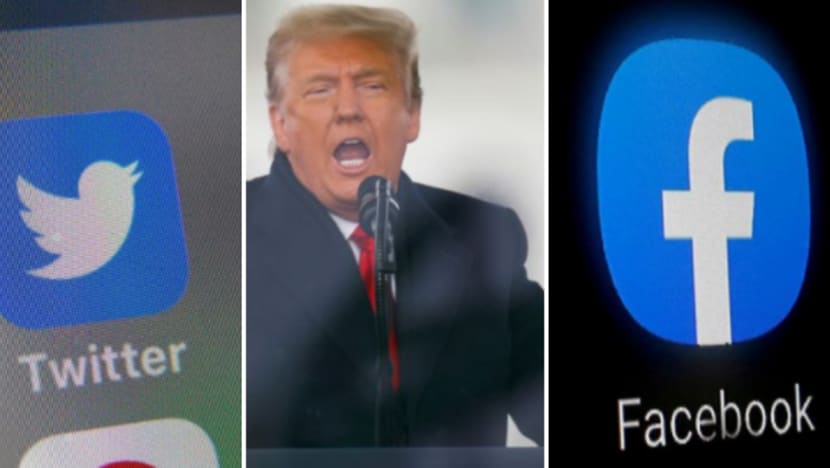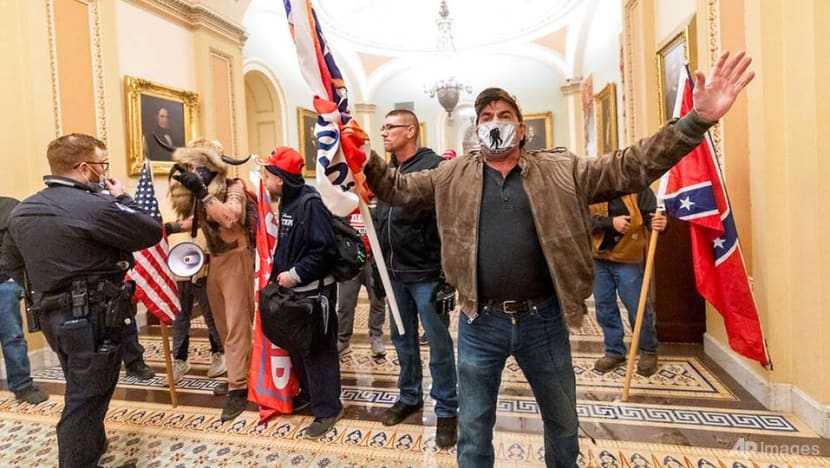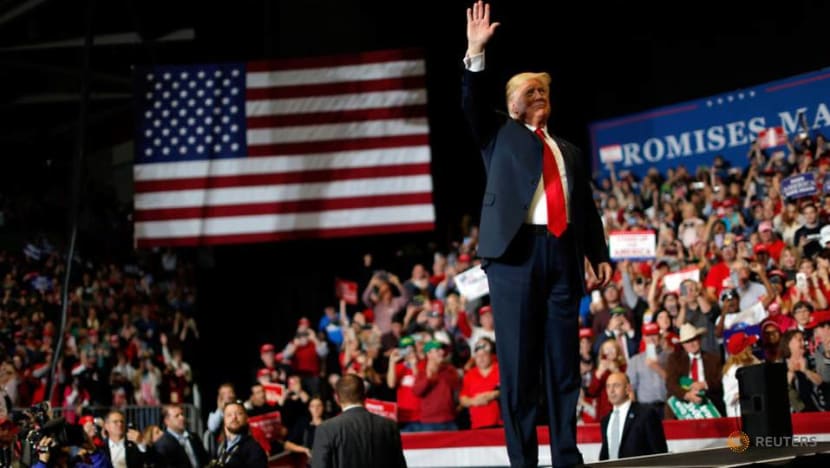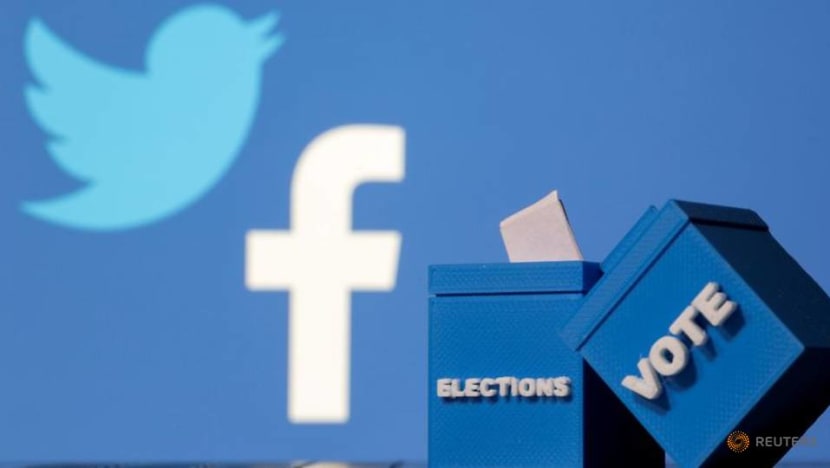commentary Commentary
Commentary: Has corporate influence gone too far in America?
Facebook and Twitter’s suspension of Donald Trump’s account has shone a spotlight on the role of Big Business in US politics, says Yale-NUS’ Nomi Claire Lazar.

Composite photo of Twitter, Facebook and former US President Donald Trump. (Photos: AFP, Reuters)
SINGAPORE: In the wake of the Jan 6 attack on the American Capitol, Facebook and Twitter did something momentous: They cut off a sitting US president from his established mode of public communication.
Donald Trump had long used his @realDonaldTrump handle to communicate directly with followers, hurling insults, announcing new policies, and riling up his base.
After his election loss, Trump used this platform to spread false allegations of electoral fraud. Challenging followers to fight and not give up, he invited them to march on the Capitol, where, on that day, members of Congress were in the process of certifying election results.
Five people were killed. Some in the crowd came equipped to kidnap and assassinate members of Congress. And a gallows was erected outside for then Vice President Mike Pence, who had defied President Trump by recognising the election result.
The world looked on astonished.

Twitter explained:
After close review of recent Tweets from the @realDonaldTrump account and the context around them, we have permanently suspended the account due to the risk of further incitement of violence.
In the days that followed, the Washington Post reported a dramatic decrease in social media posts mentioning electoral fraud. Clearly, quieting Trump impacted the political scene.
These developments have shone public attention on corporate influence in American politics. Has the power of corporations reached some new and dangerous tipping point?
Some pundits worried what Twitter’s and Facebook’s actions meant for free speech, and fretted about the power of private corporations to intervene in American political affairs.
READ: Commentary: Facebook’s eleventh-hour suspension of Trump’s account raises questions about its motives
Certainly, corporations and other special interests already wield enormous influence in American politics. Yet, it would be a grave mistake to conflate Trump’s ejection from these social media platforms with corporate political interference more generally.
CAMPAIGN FINANCING
The campaign finance system in the United States and its oversight has always been byzantine.
But it became that much more complex after the US Supreme Court found in 2010 that it was unconstitutional to limit unions, corporations and other special interests’ spending on political advertising, so long as that money did not go directly to candidates.
Even if this Supreme Court ruling were overturned, and campaign finance laws made stricter, private interests would remain influential. This is because American elections are extremely expensive.
READ: Commentary: How Joe Biden won the 2020 US presidential election
Consider how elections in Singapore, and other Commonwealth countries, last just a few weeks. That limits their cost. But American elections take years.
And in Singapore and other Commonwealth countries, candidates run on central party platforms, with strong party discipline. That means the party advertises on all candidates’ behalf. That limits costs.
In the US system, where it is more common for candidates to take their own position on specific issues, every candidate needs to make their own case. That’s expensive.
This is how individual candidates may become beholden to highly localised interests that can help fund campaigns. Unless candidates have enormous personal wealth, which poses a different bag of challenges, all that money has to come from somewhere.

The 2020 American election cost a staggering US$14 billion.
PLUTOPHILANTHROPY
A second, more insidious way money can bleed into politics is “plutophilanthropy”. Those with outsized wealth can have an outsized voice in shaping policy priorities between elections by influencing the political grass roots.
Billionaire oil brothers David and Charles Koch bankrolled and helped organise the conservative Tea Party movement, which after it gained mainstream traction in 2009, some see as a turning point in American political polarisation.
Through their control of media and of a putatively grass roots republican agenda, driven by the American For Prosperity group, the Koch brothers, became so powerful that, as Jane Meyer reported in the New Yorker, lawmakers would appeal to them directly if they needed to rustle up Congressional votes, despite the fact they had never been elected to office.
READ: Commentary: Facebook’s safeguards for the US election are the right move
There is no obvious remedy for this kind of corporate power, other than transparency and aggressive redistributive taxation.
CORPORATE SOCIAL RESPONSIBILITY?
But the Twitter and Facebook case is importantly different. Recently, many corporations have established standards of ethical responsibility toward their employees, the environment, and the societies in which they do business that go beyond what government regulation requires.
This movement is called Corporate Social Responsibility (CSR). Companies that embrace it reap many advantages.
Employees with a sense of purpose are happier and more committed to their work. Brands with a good ethical reputation get good press, and win customer loyalty too.
READ: Commentary: Is Facebook cosying up to Donald Trump?
Conversely, corporations like Nestle and Nike who have faced large-scale boycotts know all too well the costs of an ethical misstep.
So, sometimes, public and corporate interests align. This is especially the case when it comes to the rule of law.
Corporations need stable legal and political environments in which to operate. Here, their interest in a stable business environment aligns with a foundational public good.
Beyond a CSR perspective, it is morally (and often legally) incumbent on corporations to take steps to prevent the things they do and make from harming people. Corporations that fail to take such steps may, under certain conditions, be held responsible and face litigation.

But, should a corporation decide when a leader can speak? Shouldn’t that be up to the people? It was. Inciting violent insurrection is a crime, for which Trump has now been impeached. Twitter merely refused to allow their product to be used for criminal purposes.
Regardless, there is nothing wrong with private corporations enforcing an existing ethical use policy applicable to all users without discrimination. And after all, with access to the world’s press through the traditional, fact-checking media, Trump was not entirely silenced.
The President of the United States is not above the law, and no corporation is obliged to put their wares at as his disposal for unethical, or illegal use.
READ: Commentary: What’s behind the outrage over WhatsApp’s new terms and conditions
THE LARGER QUESTION
Evidently, the case of Twitter and Facebook is fundamentally different from other types of corporate and special interest influence on American politics.
Doubtless, the presence of any organised and wealthy special interests that do not align with public interest can be detrimental to the health of a democracy.
Even the perception that wealth creates outsized influence can undermine trust in government.
READ: Commentary: We are living in a golden age of ignorance
Yet, we can and should expect corporations to do their part in protecting democracy, security of person, and the rule of law by enforcing ethical standards for the use of their wares.
While shareholder interests will generally prevail, it is a fine thing when corporations recognise the ways public and corporate interest come together.
In taking away Donald Trump’s megaphone after the insurrection, the question for Twitter and Facebook is not whether their actions were an abuse of corporate power, but whether those actions went fast and far enough to serve the public interest.
Listen to Prof Chan Heng Chee and BowerGroupAsia Managing Director James Carouso explain how America came to be so deeply divided amid a bitterly fought election on CNA's Heart of the Matter podcast episode published in November 2020:
Nomi Claire Lazar is Associate Professor of Social Sciences at Yale-NUS College and the author of States of Emergency in Liberal Democracies (Cambridge, 2009) and Out of Joint: Power, Crisis, and the Rhetoric of Time (Yale Press, 2019).















